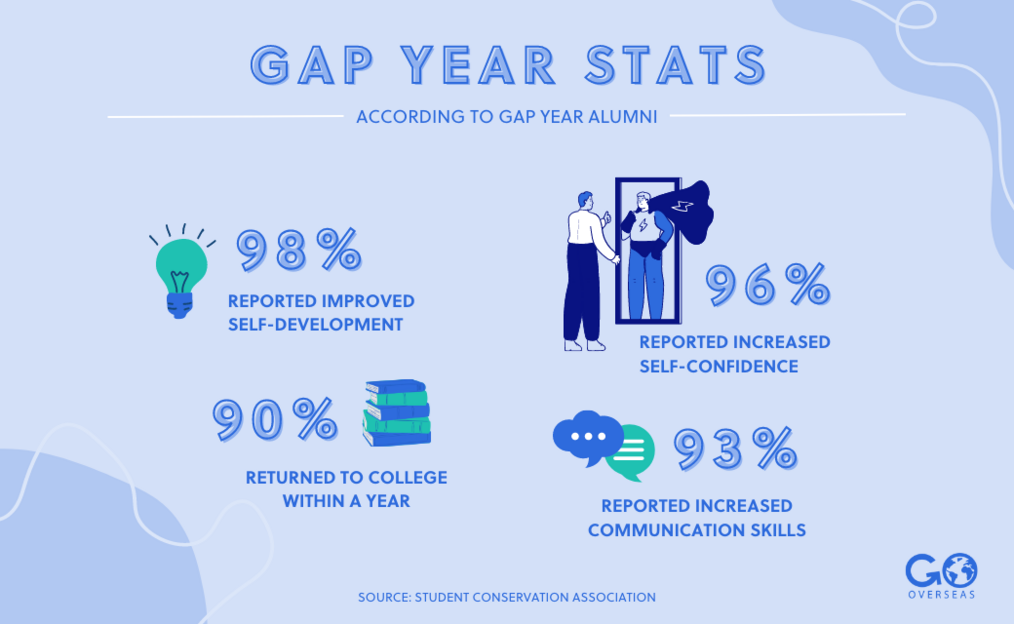
What is a Gap Year & How Do You Take One?
Want to take a gap year, but not really sure what that means? Let's answer some of the most common questions and see if a gap year is a good fit for you.
Key Takeways 🔑
- A gap year is a dedicated break from work or studies, in pursuit of personal growth through experiential learning.
- Taking a gap year can minimise burnout, enhance personal freedom, foster professional development, and diversify your resume.
- Despite what some people may think, studies show that 90% of people who take gap years return to college, with their gap year experience proving to be confidence boosting and creatively inspiring.
Have you considered taking some time off of work or school to set off for some far-flung destination in order to avoid burnout? These aren't unique feelings, and many of us can relate to the desire to experience a new adventure.
Gap years are becoming more common in the US, (It’s already popular in parts of the world!) as employers are opening their eyes to the personal and professional benefits of a gap year.
If you're curious about the concepts of gap year or wondering it’s right for you, you’re in the right place! We're here to answer your questions, share the advantages and disadvantages, and teach you how to plan a successful gap year abroad.
What is a gap year?
A gap year (also referred to as a sabbatical year) is a dedicated break from traditional work or studies, in pursuit of personal growth through experiential learning. How you spend your gap year is up to you!
Want to volunteer with sea turtles in Thailand? Learn to surf in Australia or Teach English in Vietnam? When taking a gap year, this break should be intentional and set with clear goals and a timeline -- not an opportunity to skip school or work and stagnate! It’s time to allow your brain to work in different ways, rest after a stressful period, and explore other interests.
How long is a gap year?
For some, a gap year could be a few weeks away from home during summer break, while other gappers might choose to take a semester off from university. There is no rule that it has to actually be a year! Likewise, some take more than a year or split their time up over a couple of years, working intermittently.
A gap year is more about what you do with your time and not about how long you do it.
Video: 20 Gap Year Ideas and How to Plan One! 🗺️✈️
GO's travel expert Ashely, shares exciting gap year ideas and walks you through how to plan it!
Who usually takes a gap year?
While gap years are often associated with undergraduates or postgraduates, a gap year is the perfect option for people of all ages and professions.
A gap year may be right for you if…
- You want to travel the world before settling into your desired profession
- You need a break from the monotony of academic life or the 9-5 hustle
- You want to expand your comfort zone and develop your independence skills
- Want to broaden your perspective by immersing yourself in vastly different cultures
- Want to travel and try new things!
What are the pros & cons of a gap year?

As with any significant life decision, a gap year has pros and cons. Each individual is different, as is each situation, so be sure to spend some time thinking about your intentions, your goals, and your specific situation before opting for – or against – a gap year.
Benefits of a gap year
- Minimizes burnout: A gap year is the perfect opportunity to rest, recharge, and rejuvenate yourself. You’ll have the opportunity to dive into other interests, and come back to your work or studies feeling more focused and engaged.
- Reduces pressure: If you’re used to balancing a demanding schedule, a gap year can give you some time away from those stressors. During your gap year, you can take control of your schedule, eliminating pressure from your course load or boss.
- Enhances freedom: You’ll have the freedom to experience the world around you on your terms. You can expand your perspective and self-reflect before settling into the next stage of life. Many people will also utilize this time to learn new life skills and build personal responsibility.
- Builds personal development skills: According to data accumulated by the Gap Year Association, 96% of gap year alumni reported improved self-confidence and 93% said they developed better communication skills. Especially if your gap year is your first time traveling alone, you’ll build important skills like increased independence or adaptability.
- Improves professional development: The perception from colleges and employers on gap years has trended positively over the last few years, as gappers return with a renewed purpose and improved soft skills. Navigating the globe can help develop cultural adaptability, leadership, independence, organizational skills, and more.
- Can diversify your resume: The skills, connections, and experiences acquired during a gap year can differentiate your resume from your peers, which will help set you apart in job interviews and even expand access to financial aid, grants, and scholarships.
Disadvantages of a gap year
- Financial costs: The financial commitment of taking a year off is the most common cause for hesitation. Traveling can be expensive, and there may be drawbacks financially later on.
- Decelerated career progression: There is an opportunity cost for every decision, and time off may put you “behind” classmates in school or colleagues in the professional space. This may mean it takes longer to graduate or catch up to your peers' income.
- Break in momentum: While taking a gap year can give you some great mental breaks and allow you to return to your job or studies with renewed vigor, you may also lose some momentum. You’ll need to allow yourself time to get back into the routine of studying and working. About 10% of those who take a gap year during their college years decide not to return to their studies after their time away, according to The Wall Street Journal.
- Mental challenges: Believe it or not, traveling the world (especially solo travel) can get lonely. It's important to consider your mental health and wellbeing when making the drastic lifestyle changes that international travel entails. The CDC has a guide on mental health and travel which shares insight into possible risks and stresses before setting off on a long-term international trip.
Keep reading: The Pros & Cons of Taking a Gap Year
When can I take a gap year?

There is no hard and fast rule about when you are allowed to take a gap year. There are, however, some natural breaks in education and career timelines that make for great opportunities. The most popular time to take a gap year is after graduating high school or college. That said, more professionals are pursuing a gap year between employment. As you're learning, gap year is a very flexible term, and you're never too old to take a break and invest in yourself!
Common times to take a gap year
- After high school: Not everyone is ready for college right after high school, making for an opportunistic time for a gap year. You’ll be able to travel without the pressures of college classes, explore your own humanity, and perhaps discover what you’re genuinely passionate about before recommencing your education.
- During college: After a year or two of college, taking a gap year can help you reevaluate and recommit to your education. You may find that when you return, your priorities have shifted, which is expected and completely normal. A gap year puts a new perspective on life, and that's a good thing!
- After college: After college, the pressures to start working begin mounting up. However, many see this time period as their last chance for a grand adventure before building a career. A gap year is a good resume builder, offering both personal and professional development. You’ll refine your social, independence, and cultural adaptability skills. Additionally, you may make connections or find a job that positively alters your life's trajectory.
- During your career: While not as commonly discussed, taking a mid-career or professional gap year is always still an option. A gap year can help you gain perspective on a potential career change or promotion, and it can also give you much more freedom. As an adult, you will likely have a bigger budget and a better idea of what you want to get out of your gap experience.
What age is best for a gap year?
While gap years are often associated with those who have graduated from their high school or college, it is beneficial for someone of any age as long as they benefit from traveling the world and getting respite from education or their career.
How to take a gap year

Now that you’ve decided you’re taking a gap year, it’s time to start planning! Where do you want to go? What do you want to do? How are you going to pay for it? These are all the questions you are going to have. And they are good questions.
1. Consider your budget, time-frame, and goals
While you may be excited at the prospect of taking a gap year, it will require thorough planning to ensure that it goes smoothly. You will need to take into account many different factors, whether they are logistical or are down to your personal preference.
Ask yourself the following questions:
- What is your budget?
- Do you have dependents?
- Can you defer your admission, scholarships, and financial aid if you're in college?
- If you're employed, will your company allow you to take significant time off, or will you need to quit your job?
- What are your goals and aspirations for taking time off?
- Where do you want to go?
- What skills do you want to improve?
2. Decide where you want to go
Traveling abroad is a popular (but not essential) aspect of most gap years. While many gappers tend to head to the tropics of South America, sunny Southeast Asia, or European cultural hubs, gap years can also be spent in one’s home country.
Choosing where to go can be tough. If you do desire to go overseas, ask yourself the following questions:
- What languages do you speak, and do you want to be immersed in a foreign language?
- What countries can you get a visa to visit, and how long will that visa permit you to stay?
- What are the current health restrictions for international travel?
- What activities do you want to participate in while abroad?
- What is your budget, and what country can you afford to live in throughout the gap experience?
Read More: 5 Realistic Ways to Get Free Accommodation While Traveling
3. Choose how you want to spend your gap year
Gap years have many purposes. Travel is often the main one, but even that can take on many forms. You can put your foreign language skills to the test—or learn a new one through an immersion program. You can volunteer overseas for part or all of the time. Or you can combine them with some adventure travel and try a little bit of everything. There’s no wrong way for you to spend your time.
If you're looking for inspiration, check our selection of the best gap year programs.
4. Start budgeting and applying for travel scholarships
Just like your education, there are many options for funding a gap year. You can pay out of pocket, of course, but there are also scholarships and grants available. Check with your school on the scholarship or financial aid transfer they may offer if your gap year offers some academic credit. Gap year program providers also commonly have need-based scholarships to make their programs accessible to more people.
Read more: How to Budget for Your Gap Year
Do colleges look at gap years?

Sometimes, colleges or employers may ask what you did during this time on your resume. Rather than focusing on how you may not have gained formal work experience, interviewers will appreciate the personal benefits you gained from traveling the world, such as cultural adaptability, independence, sociability, and more.
Read more: What Do College Admissions Really Think of Your Gap Year?
How many people who take a gap year actually go to college?
Some people may argue that those who take gap years are highly unlikely to return to education. However, research shows otherwise, with around 90% of undergraduates in the US who take gap years returning to college within a year.
While many people who take gap years proceed to complete their education, gap years expose people to new ways of life and opportunities which do not require further education. In addition to personal fulfillment, gap years are even thought to be creatively inspiring and a way to foster mental stability by increasing confidence, independence, and self esteem - traits which help people thrive throughout academia.
Are gap years worth it?
While it grants you the freedom to go wherever you want and do whatever you like, the amount of choice can be overwhelming. If you are able to benefit from exercising freedom and independence, gaining cultural insight, spiritual development, and much more, a gap year is certainly worth it for someone’s personal growth.
Reinvigorate yourself with a gap year!

Taking a gap year can be a monumental decision, and for good reason! From personal experience, a gap year is a life-changing adventure. There were countless nights alone with my own thoughts and days spent on the trail turning strangers into lifelong friends. I experienced scenes that took my breath away, the joys of deep connection, the pain of loss, the fear of the unknown, and the pride of accomplishment.
My gap year pushed me to be a better human, a more empathetic friend, and a more inspired artist. Words will never truly describe what my dedicated time off meant to me, but it led me here, sharing this with you.
While a gap year isn't for everyone, if you feel the drive to take on the challenge of self-growth through experiential learning, start looking for gap year programs today!
Plus, you don't have to do it alone. Our gap year counselors page will answer frequently asked questions, allow you to register for upcoming gap year planning events, and connect you with experts eager to help.






